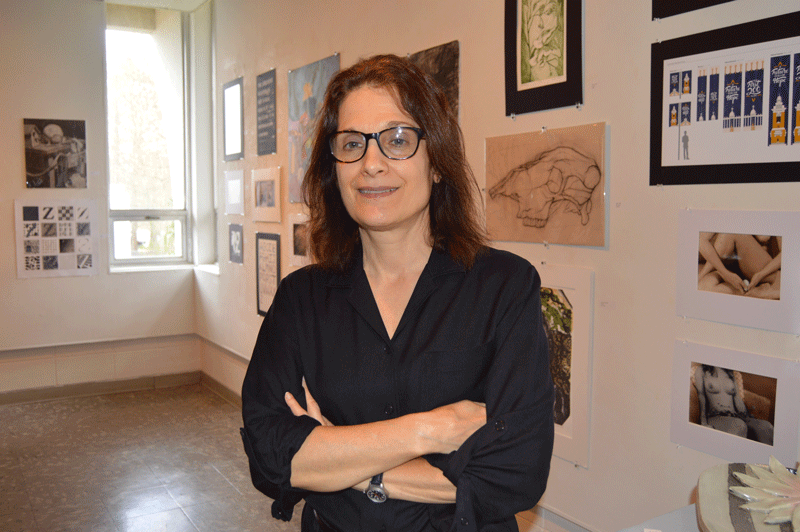Photo by: Juana Martinez
Deborah Cibelli talks about her life experiences, achievements and interests in the Ameen Art Gallery, Talbot Hall.
Getting to know Deborah Cibelli
March 23, 2017
Deborah Cibelli, professor of art history, shares how her love for art history came about and encourages students to take advantage of their resources.
Cibelli grew up in Brooklyn, New York. Despite her attraction to art history, she said she was, in no way, an artistic child. As a child, Cibelli enjoyed reading science-fiction novels written by Isaac Asimov and Ray Bradbury. Her favorite pastime was heading to the library.
“I would go to the library and I would pick up anything that seemed interesting,” Cibelli said. “I liked science-fiction, so books by Isaac Asimov and Ray Bradbury were very interesting to me. I think everyone, at that time, had a Ray Bradbury phase.”
Cibelli completed her undergraduate degree in art history at the State University of New York at Geneseo. It was through a series of foreign language courses that she discovered her passion for art history.
“My choice of art history as a career path stems from my early interest in foreign language and culture,” Cibelli said. “In my foreign language classes, we had to do projects and I always ended up picking artists. I worked on Picasso for Spanish and Paul Gauguin for French. I was attracted to these research projects and felt very inspired.”
As an undergraduate student, Cibelli found comfort in a faculty mentor. The faculty member encouraged students to consider graduate school and a career in art history.
Upon graduating from SUNY Geneseo, Cibelli pursued her doctoral degree at the State University of New York at Binghamton. Cibelli was pleased when she realized her undergraduate mentor was completing the same PhD program.
“It was a life changing experience by attending seminars with a professor I respected so highly,” Cibelli said. “It made me appreciate the value of lifelong learning and I came to admire anyone who persevered with their studies or embarked upon a new career.”
By the time Cibelli completed her graduate degree, she had enough credits to acquire another Bachelor of Arts degree, except that her credits were on the graduate level.
Before making her way to Nicholls State University, Cibelli taught at State University of New York at Oswego and Youngstown State University in Ohio. One of Cibelli’s first projects at Nicholls involved collaboration with other faculty on a Louisiana Endowment for the Humanities Summer Institute, which lead to the development of a survey for British art for Honors Abroad- England.
Since then, she’s conducted research on the sculpture garden by Kenneth Hill in Chauvin. Her article about the garden ended up being published in the journal “Raw Vision.”
“In graduate school, I studied with art critic John Perrault,” Cibelli said. “He encouraged students to write about art that had never been written about before.”
Cibelli’s article was recently reissued by Gris Gris, an online journal published by the Department of Languages and Literature.
Cibelli’s also co-edited “Light and Obscurity in Symbolism,” had her research included in a study by European publisher Brepols and presented her findings at a Renaissance Society of America conference held in Florence, Italy.
The art history professor is affiliated with Art, Literature and Music in Symbolism and Decadence, an organization that promotes the research and discussion of the Symbolist movement in art. She’s also president of the Friends of Thibodaux Library.
“I’m now working on the impact of Renaissance books on the art of the 19th century illustrator, Aubrey Beardsley,” Cibelli said. “I have a new idea for a study of the commedia del’ arte – or a popular Renaissance theater – and Picasso.”
Not only does Cibelli enjoy teaching art from different historical periods and conducting research of her own, but she likes to supervise student research. Cibelli appreciates the resources Nicholls’ has provided for herself and the students. She would like for the students to take advantage of the opportunities offered on campus.
“I enjoy research and I appreciate the resources we have here at the university to pursue it,” Cibelli said. “I hope students feel the same way and conduct research, write papers and make presentations at events such as the Undergraduate Humanities Symposium and the undergraduate poster competition, Expeaux.”
